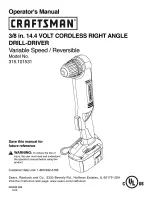
8
decrease in blade speed to avoid overheating the
blade tips.
2.
Do not attempt to remove cut material when blade
is moving. Wait until blade stops before grasping
cut material.
Blades coast after turn off.
3.
Avoid cutting nails. Inspect for and remove all
nails from lumber before cutting.
4.
Place the wider portion of the saw base on that
part of the workpiece which is solidly supported,
not on the section that will fall off when the cut is
made. If the workpiece is short or small, clamp it
down. DO NOT TRY TO HOLD SHORT PIECES BY
HAND!
(Fig. 5)
5.
Before setting the tool down after completing a
cut, be sure that the guard has closed and the
blade has come to a complete stop.
6.
Never attempt to saw with the circular saw held
upside down in a vise. This is extremely
dangerous and can lead to serious accidents.
(Fig. 6)
7.
Some material contains chemicals which may be
toxic. Take caution to prevent dust inhalation and
skin contact. Follow material supplier safety data.
8.
Do not stop the blades by lateral pressure on the
saw blade.
9.
Do not use any abrasive wheels.
10.
Only use the saw blade with the diameter that is
marked on the tool or specified in the manual.
Use
of an incorrectly sized blade may affect the proper
guarding of the blade or guard operation which could
result in serious personal injury.
11.
Keep blade sharp and clean.
Gum and wood pitch
hardened on blades slows saw and increases
potential for kickback. Keep blade clean by first
removing it from tool, then cleaning it with gum and
pitch remover, hot water or kerosene. Never use
gasoline.
12.
Wear a dust mask and hearing protection when
use the tool.
13.
Always use the saw blade intended for cutting the
material that you are going to cut.
14.
Only use the saw blades that are marked with a
speed equal or higher than the speed marked on
the tool.
15.
(For European countries only)
Always use the blade which conforms to EN847-1.
SAVE THESE INSTRUCTIONS.
WARNING: DO NOT let comfort or familiarity with
product (gained from repeated use) replace strict
adherence to safety rules for t he subject product.
MISUSE or failure to follow the safety rules stated in
this instruction manual may cause serious personal
injury.
IMPORTANT SAFETY
INSTRUCTIONS FOR BATTERY
CARTRIDGE
ENC007-12
1.
Before using battery cartridge, read all
instructions and cautionary markings on (1)
battery charger, (2) battery, and (3) product using
battery.
2.
Do not disassemble battery cartridge.
3.
If operating time has become excessively shorter,
stop operating immediately. It may result in a risk
of overheating, possible burns and even an
explosion.
4.
If electrolyte gets into your eyes, rinse them out
with clear water and seek medical attention right
away. It may result in loss of your eyesight.
5.
Do not short the battery cartridge:
(1)
Do not touch the terminals with any
conductive material.
(2)
Avoid storing battery cartridge in a container
with other metal objects such as nails, coins,
etc.
(3)
Do not expose battery cartridge to water or
rain.
A battery short can cause a large current flow,
overheating, possible burns and even a
breakdown.
6.
Do not store the tool and battery cartridge in
locations where the temperature may reach or
exceed 50°C (122°F).
7.
Do not incinerate the battery cartridge even if it is
severely damaged or is completely worn out. The
battery cartridge can explode in a fire.
8.
Be careful not to drop or strike battery.
9.
Do not use a damaged battery.
10.
The contained lithium-ion batteries are subject to
the Dangerous Goods Legislation requirements.
For commercial transports e.g. by third parties,
forwarding agents, special requirement on packaging
and labeling must be observed.
For preparation of the item being shipped, consulting
an expert for hazardous material is required. Please
also observe possibly more detailed national
regulations.
Tape or mask off open contacts and pack up the
battery in such a manner that it cannot move around in
the packaging.
11.
Follow your local regulations relating to disposal
of battery.
12.
Use the batteries only with the products specified
by Makita.
Installing the batteries to non-compliant
products may result in a fire, excessive heat,
explosion, or leak of electrolyte.
SAVE THESE INSTRUCTIONS.
CAUTION: Only use genuine Makita batteries.
Use of non-genuine Makita batteries, or batteries that
have been altered, may result in the battery bursting
causing fires, personal injury and damage. It will also void
the Makita warranty for the Makita tool and charger.
Tips for maintaining maximum battery life
1.
Charge the battery cartridge before completely
discharged.
Always stop tool operation and charge the battery
cartridge when you notice less tool power.
2.
Never recharge a fully charged battery cartridge.
Overcharging shortens the battery service life.
Summary of Contents for DHS710TJ
Page 2: ...2 1 000157 1 2 000154 3 000156 4 000194 5 000147 6 000029 7 014204 8 014205 1 2 3 4 5 ...
Page 82: ...82 ...
Page 83: ...83 ...









































